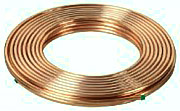Concerns about Copper in Direct Exchange (DX) Geothermal Systems
A common concern about Direct Exchange (DX) geothermal systems is that the copper tubing may corrode and leak refrigerant creating an environmental hazard. Misinformation and rumours are in no short supply. We'll try to set the record straight.

Copper comes from the ground. If it naturally corroded in the ground, we would not have it -- it simply would have corroded itself out of existance. Copper water pipes have been buried in the ground for over a hundred years in many parts of the US. Copper is a "noble metal", meaning it is resistant to corrosion or oxidation, unlike most base metals. However, certain types of acids in the soil can effect the life of the copper. Also, naturally occurring or man-made ground current (electric current present in the soil) can effect copper. Both of these conditions may be easily overcome as long as they are determined prior to installation.
Before installing the loop, the dealer or contractor should do a soil test to determine the acidity of the soil and if measures are required to protect against acidity. Manufacturer's recommend that soils be checked for high concentrations of acids, chlorides, hydrogen sulfide, sulfates or ammonia; these are to be avoided because of the potential for corrosion. To determine whether or not this is an issue, soil samples can be taken at a depth of 3 feet where the manifold pit would be placed.
In North America, a very low percentage of land area has soil conditions where copper would corrode. These areas are acidic with a pH below 6.0. Copper will not corrode unless the pH is lower than 6.0. If it is lower than that, precautions need to be taken.
Acidic soil can be counteracted by bedding the ground coil in a layer of limestone, manufactured sand, or flowable fill. DX boreholes are pressure-filled with grout (typical grout mixture consists of Type 2 cement, #30 fine silica sand, sodium bentonite, Superplastisizer and water is mixed using a chem-grout piston pressure pump or something similar.)
Corrosion of the copper earth loop in acidic soil can be eliminated through installation of a sacrificial anode. A sacrificial anode, or sacrificial rod, is a metallic electrode used in cathodic protection where it is intended to be dissolved to protect other metallic components.The more active metal corrodes first (hence the term "sacrificial") and generally must oxidize nearly completely before the less active metal will corrode, thus acting as a barrier against corrosion for the protected metal.
Coated copper or cathodic protection are other viable safety measures. Earthlink uses "impressed current" cathodic protection that continually bombards the copper loop with electrons, not a sacrificial anode cathodic protection.
Now that we've established that the copper won't corrode from the outside, let's consider the inside. Refrigerant is an inert gas - it does not, cannot cause electrolysis, so it won't corrode from the inside.
Concerns about Copper in Direct Exchange (DX) Geothermal Systems copyright 2011 Digtheheat.com
